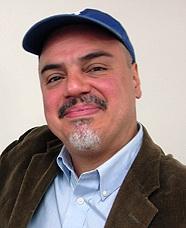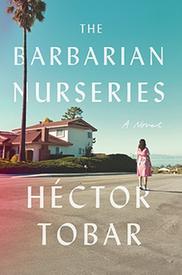 Héctor Tobar, born in Los Angeles to Guatemalan immigrant parents, is a former foreign correspondent and now columnist for the Los Angeles Times; his previous books are Translation Nation: Defining a New American Identity in the Spanish-Speaking United States and the novel The Tattooed Soldier. His new novel, The Barbarian Nurseries, a tale of modern Southern California, will be published by Farrar, Straus & Giroux on September 27, 2011.
Héctor Tobar, born in Los Angeles to Guatemalan immigrant parents, is a former foreign correspondent and now columnist for the Los Angeles Times; his previous books are Translation Nation: Defining a New American Identity in the Spanish-Speaking United States and the novel The Tattooed Soldier. His new novel, The Barbarian Nurseries, a tale of modern Southern California, will be published by Farrar, Straus & Giroux on September 27, 2011.
On your nightstand now:
Austerlitz by W.G. Sebald. I think I had to be older to enjoy this book, having started it some years back and given up. Now I'm on the final pages and finding its Proustian wanderings through the psychological wreckage of modern European history utterly amazing. Next up: I Hotel by Karen Tei Yamashita or The History of the World in Ten and a Half Chapters by Julian Barnes.
Favorite book when you were a child:
The People's Almanac by David Wallechinsky and Irving Wallace. I carried this thick (and now forgotten) collection of anecdotes, lists and musings around with me everywhere when I was 13 years old.
 Your top five authors:
Your top five authors:
Don DeLillo: I wouldn't be writing books if hadn't read DeLillo when I was in my late 20s; among other things, I saw my Los Angeles in his Bronx. Miguel de Cervantes: I read Don Quixote at 40 (the Edith Grossman translation, which is vivid, modern) and realized it was, at once, a celebration of the power of realism and of the imagination (and isn't that what fiction is all about?). Shakespeare: I'm about halfway through his oeuvre, and all I can say is "The dude had quite a range." Toni Morrison: the sweep and strangeness in Song of Solomon felt like Latino history to me; her books opened a path so many of us have taken since. Anton Chekhov: the good doctor observed and then dissected the social mores of a society that was about to consume itself.
Your reading "guilty pleasures":
War nonfiction. Anything about Gettysburg and Stalingrad, especially. And anything about the last days of the Confederacy (and slavery) and the last days of the Third Reich. I really enjoy seeing the bad guys of history lose over and over again.
Book you've faked reading:
Ulysses. Every couple of years, I give it another go.
Book you're an evangelist for:
Blindness by Jose Saramago. Utterly gripping from start to finish, it's an allegory about all the horrors of the 20th century and an amazing work of imagination.
Book you've bought for the cover:
The Mambo Kings Play Songs of Love by Oscar Hijuelos. The book inside isn't bad either.
Book that changed your life:
Woman Hollering Creek by Sandra Cisneros. This came out at about the time I started writing fiction. It was a polished, poetic collection of stories; serious about craft and also very close to my own experience. I read it and decided I should quit my newspaper job and get an MFA if I wanted to write books myself. Which is what I did.
Favorite line from a book:
"There was so much sound in the iron of those curves he could almost taste it, like a toy you put in your mouth when you are little." From Don DeLillo's Libra, describing Lee Harvey Oswald obsessively riding the subways in New York. I read that when I was about 26 or so and felt a shift in my writing brain: I was never the same after that. (Years later, by the way, I concluded the entire premise of the novel was wrong, but that's another story.)
Book you most want to read again for the first time:
The Stranger by Albert Camus. But in French this time, which would involve quite a bit of study.

